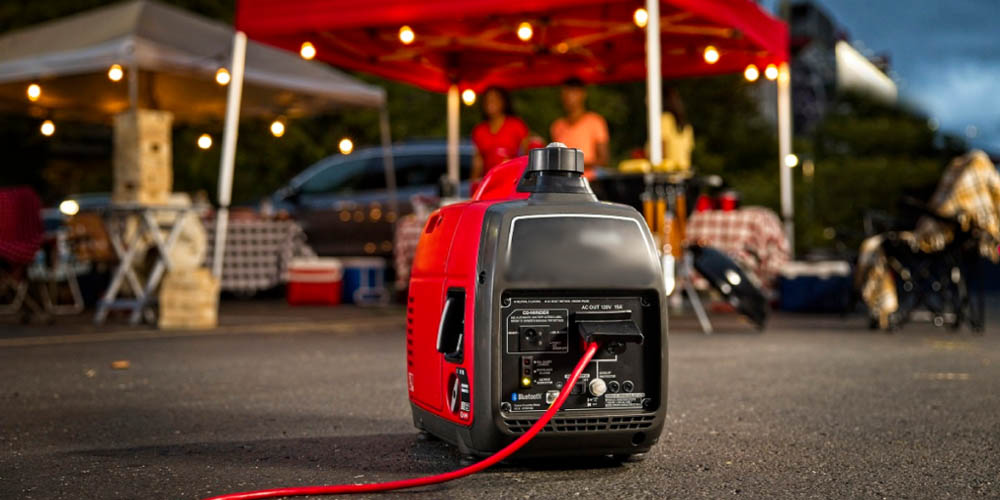8 Basic Maintenance Tips for Your Small, Portable generator
Generators, like any other machine, require regular maintenance. Nowadays, almost every professional mechanic, workshop owner, and even DIYer are using small, portable generators as it is easy to take them anywhere while enjoying an uninterrupted power supply.
It is critical to have an inverter generator on hand in case of a power outage. However, simply purchasing one is not enough alone. With both expected and unexpected blackouts, regular maintenance on your portable generator is also required.
Proper generator maintenance can save your life. Maintenance typically entails planning, knowing what to look for, and proper storage. Let’s go over the basic steps of maintaining a small generator in this blog. But first, if you don’t have one and are looking for buying it online, you have come to the right website of Golden Tools.
When not in use, you should carefully store your generators. The majority of instruction manuals include detailed storage advice.
Though a fuel stabilizer can be used to store the generator with fuel, draining the fuel is the best option. Before draining the generator's fuel, ensure that it has completely cooled down.
Purchasing a portable generator enclosure will be advantageous in the long run. In it, you can keep a clean generator. Your generator will be adequately ventilated while remaining dirt-free. Even if you plan to use the generator later, you can leave it in the enclosure.
Ideally, you need to check the spark plug every 100 hours of use. It is common to find oil and carbon residues on the plug.
Remove debris with compressed air. Sandpaper the electrode of the spark plug. Gently scrub the threads with a wire brush. Scrubbing too hard can damage the threads, rendering the plug 'unfit'
If the spark plug is cracked, cleaning will not suffice. You'll have to replace it. After all, the spark plug is required to start the generator's engine. However, when you purchase a high-quality, durable inverter generator chances of such malfunctions are quite less.
When there is a power outage, it can take days to restore power. As a result, it's a good idea to stockpile enough fuel to last the duration of the emergency.
A small and portable generator’s long shelf life makes it a popular choice among buyers. The best inverter generators can be found in the Golden Tools online shop.
Whatever fuel you plan to stock up on, adding some fuel stabilizer extends its shelf life. Always store the fuel containers upright and in a cool, dry place.
What happens if you leave your small generator idle for an extended period? Moisture could build up and cause internal damage to the generator.
Once a month, experts recommend running your generator with a load. This is known as a test run, and it can be timed for automatic generators.
You should use an artificial load to put the generator through its paces. Only during this phase will your generator have the opportunity to practice maintaining its efficiency. Consider it a practice run for your generator.
When your portable generator sits in a room for days on end, it can get pretty filthy. Dust, debris, and even mold/moss can accumulate on your portable generator. These contaminants can seep into vital components, potentially making them less functional. As a result, you'll need to keep your portable generator clean and protected to help it last.
The best way to keep your portable generator clean is to buy a generator cover. These covers can protect your portable generator and may include additional features such as water resistance or weatherproofing.
After your portable generator has completed its task, empty its tank into a gas container. Although we recommend having enough fuel for your generator, it should not be left idle in the fuel tank. This can result in gum deposits, which occur when gas adheres to the portable generator's metal surfaces and chambers. Its performance can be hampered by gum deposits.
As a result, it's best to keep your inverter generator's fuel in a separate container after each use.
When using your generator, make sure it can handle the voltage you intend to use. Because not all portable generators are the same, you must check the product description of your portable generator to determine its wattage rating before shopping online.
This may seem obvious, but small leaks frequently go unnoticed. Look for leaks, which are common with generators.
First, inspect your fuel lines, which are the most prone to leaks. Fuel lines can crack due to weather and age, and couplers can become loose. Next, inspect the carburetor bowl gaskets, which can dry out and become damaged. This weakens the seal, allowing fuel to leak beneath the carburetor. Check out the following as well:
Fuel Tanks: :
Over time, fuel tanks become brittle. Welds on seams deteriorate as a result of corrosion and punctures. Extreme temperatures, overfilling, and acid and salt buildup are common causes.
Pipes: :
Like fuel tanks, pipes become loose and suffer from wear and tear.
Shut-off Valve: :
Over time, valves become loose and damaged.
If you notice an oil leak, fix it right away or replace the part. Don't start your generator until you've fixed the leak. Because a leak can cause an explosion, fire, or toxic fumes to escape. However, when you buy a high-quality inverter generator, the chances of such leaks are quite less.
Taking care of your small generator is similar to taking care of your car. The only difference is that you can easily forget about a generator and cause significant damage to it.
So, can you perform monthly generator maintenance? If you can't, plan for the long-term care of your generator while it's in storage. Consider how annoyed you'd be if your car broke down and you were late for a meeting. Multiply this feeling by ten if you're left without power for a week at home, despite having an inverter generator nearby.
Finally, proper generator maintenance will allow you to sleep soundly at night. Also, have a working generator for the next 20 to 30 years as a bonus!




